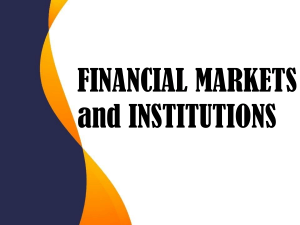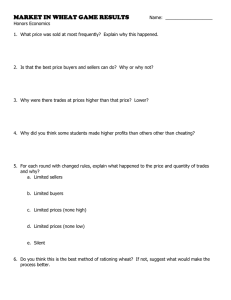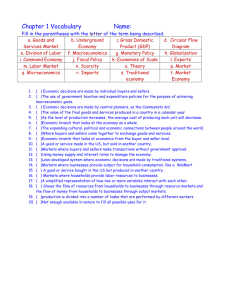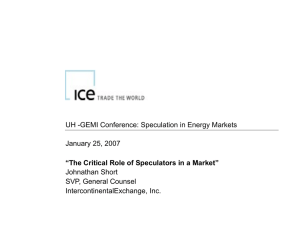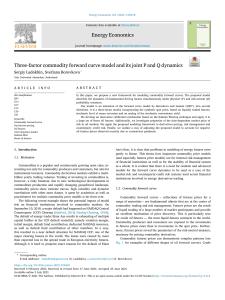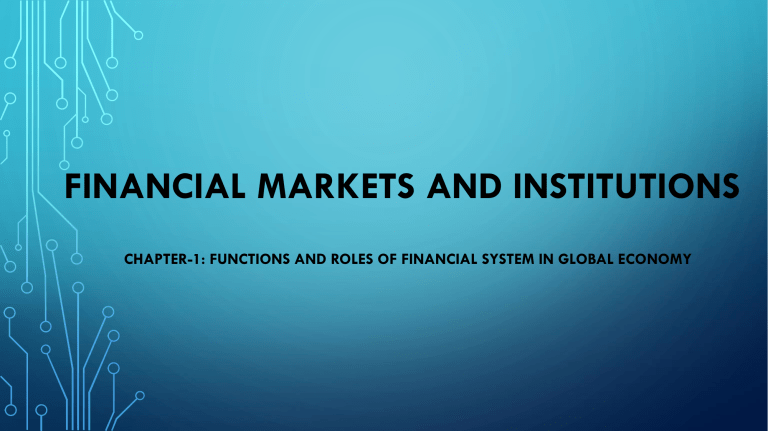
FINANCIAL MARKETS AND INSTITUTIONS CHAPTER-1: FUNCTIONS AND ROLES OF FINANCIAL SYSTEM IN GLOBAL ECONOMY FINANCIAL SYSTEM A financial system consists of institutional units and markets that interact, typically in a complex manner, for the purpose of mobilizing funds for investment, and providing facilities, including payment systems, for the financing of commercial activity. FINANCIAL SYSTEM • Primary task is to move scare loanable funds from who save to those who borrow. • Financial System determines both the cost and the quality. • Global financial system is an integral part of global economic system. GLOBAL ECONOMIC SYSTEM • An economic system is a means by which societies or governments organize and distribute available resources, services, and goods across a geographic region or country. Economic systems regulate the factors of production, including land, capital, labor. • The global economy refers to the interconnected worldwide economic activities that take place between multiple countries. It refers to the exchange of goods and services between different countries, and it has also helped countries to specialize in products which they have a comparative advantage in. MARKET MARKET • Market is an institution through which buyers and sellers meet to exchange goods, services and productive resources. • The exchange in the market determine the “What” goods and services will be produced and in what “Quantity”. • Balance demand and supply, thus determine the “Price” also. MARKET • Market is “dynamic” • Competition is there • Distribute income TYPES OF MARKET 1. Factor Market 2. Product Market 3. Financial Market THREE TYPES OF MARKETS IN THE GLOBAL ECONOMIC SYSTEM THE FINANCIAL MARKETS AND FINANCIAL SYSTEM: SAVINGS AND INVESTMENT • Financial Market: Financial markets refer broadly to any marketplace where the trading of securities occurs, including the stock market, bond market, forex market, and derivatives market, among others. Savings Investment NATURE OF SAVINGS • Households : Savings= Income- (Consumption Expenditure+ Tax) • Business Firms: Savings= Retained Earnings • Government: Savings= Surplus Budget NATURE OF INVESTMENT • Household • Business Firms • Government ECONOMIC FUNCTIONS PERFORMED BY THE GLOBAL FINANCIAL SYSTEM AND THE FINANCIAL MARKETS • Savings Functions • Wealth functions • Liquidity functions • Credit Functions • Payment Functions • Risk protection Functions • Policy functions TYPES OF FINANCIAL MARKETS IN GLOBAL FINANCIAL SYSTEM • 1. The Money Market Vs. The Capital Market • 2. Open Market Vs. Negotiated Market • 3. Primary Market Vs. Secondary Market • 4. Spot Vs. Future, Forward and Option Market TYPES OF FINANCIAL MARKETS IN GLOBAL FINANCIAL SYSTEM • • 1. The Money Market Vs. The Capital Market • Capital Market: Capital market is a market where buyers and sellers engage in trade of financial securities like bonds, stocks, etc. The buying/selling is undertaken by participants such as individuals and institutions. Money Market: Definition: Money market basically refers to a section of the financial market where financial instruments with high liquidity and short-term maturities are traded. TYPES OF FINANCIAL MARKETS IN GLOBAL FINANCIAL SYSTEM • 2. Open Market Vs. Negotiated Market • Open Market: Open Market an unrestricted market with free access by and competition of buyers and sellers. • Negotiated Market: A negotiated market is a type of market in which the prices of each security are bargained out between buyers and sellers. TYPES OF FINANCIAL MARKETS IN GLOBAL FINANCIAL SYSTEM • 3. Primary Market Vs. Secondary Market • Primary Market: The primary market is where securities are created. It's in this market that firms sell (float) new stocks and bonds to the public for the first time. An initial public offering, or IPO, is an example of a primary market. • Secondary Market: This is the market wherein the trading of securities is done. Secondary market consists of both equity as well as debt markets. TYPES OF FINANCIAL MARKETS IN GLOBAL FINANCIAL SYSTEM (1) • 4. Spot Vs. Future, Forward and Option Market • Spot Market: A spot market is where financial instruments are exchanged for immediate delivery, such as commodities, currencies, and securities. Delivery, here, means cash exchange for a financial tool. • Forward Market: A forward market is a contract entered into between a buyer and seller for future delivery of stock or currency or commodity. TYPES OF FINANCIAL MARKETS IN GLOBAL FINANCIAL SYSTEM (2) • • 4. Spot Vs. Future, Forward and Option Market Future Market: A futures market is an auction market in which participants buy and sell commodity and futures contracts for delivery on a specified future date. Futures are exchange-traded derivatives contracts that lock in future delivery of a commodity or security at a price set today. it comes under regulated organizations in which members alone are permitted to transact. The futures market will have its own rules and regulations and will also fix the minimum value for each transaction. TYPES OF FINANCIAL MARKETS IN GLOBAL FINANCIAL SYSTEM (3) • 4. Spot Vs. Future, Forward and Option Market • Option Market: Option is a contract which conveys its owner, the holder, the right, but not the obligation, to buy or sell an underlying asset or instrument at a specified strike price prior to or on a specified date, depending on the form of the option. Call Option Put Option


